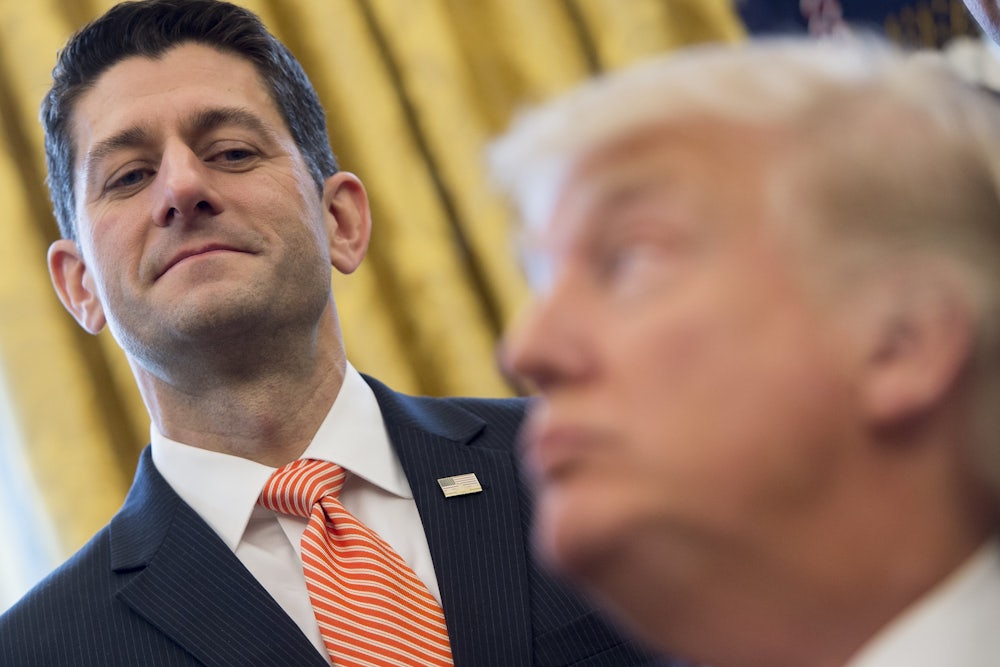Paul Ryan has wanted to clobber liberalism for years.
When he joined the GOP presidential ticket with Mitt Romney in 2012, his goal was to consolidate control of government and shepherd his budget into law. The budget itself was conceived as kind of an inverse New Deal—a radical amendment to the social contract that would have required a dizzying burst of legislative activity and a dazzling level of executive competence to implement.
When Republicans came up short in that election, he set his gaze to 2016, when, as Politico put it, he planned, as House Speaker, to “steamroll Democrats” with parliamentary techniques that would allow him to accomplish what eluded him four years earlier. The American Health Care Act—which Ryan shelved today after his own House majority refused to back it—was just a tiny slice of an agenda that included Obamacare repeal, Medicare privatization, the devolution of Medicaid to the states, huge, regressive tax cuts, and more.
As one of the leading figures in American conservatism, Ryan spent so much time fantasizing about aligning procedural stars that he lost sight of all the other elements that went into creating the welfare state he hoped to roll back. The failure of Trumpcare—which would have kicked millions of people off health insurance, while delivering a tax cut to the wealthiest Americans—underscores the shortsightedness of the idea that major social change can be created with the will to power alone.
Senate Majority Leader Mitch McConnell has never been so naive. In 2012, he acknowledged the centrality of public sentiment to the rise of liberalism, and that Republicans bore the obligation to win public trust before they set about dismantling what it took Democrats decades to build.
“[T]he American people have never given us the kind of hammerlock on Congress that Democrats had during the New Deal, that they had during the Great Society, and that they had in 2009 and 2010,” he told Kentucky radio ahead of former President Barack Obama’s reelection in 2012. “Why haven’t you been able to get better results?…The answer to that is, we haven’t had enough votes. We have elections in this country and the winners get to make policy and the losers go home. And the Democrats have had Congress, sometimes with whopping majorities, most of the time since the New Deal. And that’s a great disappointment…because we’ve not been able to secure the support of enough of the American people to have the kind of big majorities you need to kind of roll things back. Maybe some day we’ll have that. I hope so.”
After Donald Trump’s surprising Electoral College victory, McConnell was alone among Republican leaders in flashing yellow lights. It wasn’t lost on him that his 52-vote majority in the Senate wouldn’t have the capacity to pass significant, ideologically one-sided legislation, and that Trump had lost the popular vote by millions of ballots. Republicans won the presidency in 2016, but they lost seats in both the House and Senate, which is not the signal voters send when they are asking one party to impose its will.
Under those circumstances, enacting a vast, regressive, polarizing agenda wouldn’t be a masterstroke—the product of the hard work of persuasion and consensus-building. It would be a mugging.
Paul Ryan wanted the mugging. His goal—in freezing out the Congressional Budget Office, racing the legislation through committees, intimidating his defiant members—was to overcome the public sentiment problem by staying one step ahead of it. (Only 17 percent of voters supported the bill, according to a Quinnipiac poll, against 56 percent who opposed.) In choosing this route, he not only failed, but also exposed his own incompetence.
We can’t expect Republicans to govern as Democrats. They lost the popular vote, yes, but they still hold the levers of power. They won’t do liberal things out of a sense of fair play, nor should we expect them to. But they are going to have to accept the fact that there’s more to exercising power than having the mathematical capacity to pass bills in Congress.
